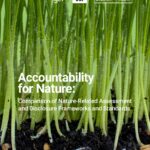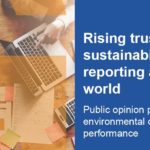Companies struggle to breach the glass ceiling of transparency and accountability
Reports are getting biggerbut not better
As trust in capitalism and multinational corporations hits new lows, corporate social responsibility (CSR) and sustainability reporting potentially offers real opportunities for companies to rebuild that trust.
This is one of the conclusions from the latest report by SustainAbility and the United Nations Environment Programme (UNEP), Trust Us: The 2002 Global Reporters Survey of Corporate Sustainability Reporting.
The report, released today, examines the top 50 corporate sustainability reports from around the world in detail, highlighting best practice and emerging issues.
Some of the findings of the survey include:
* The Magnificent Sevenand the Glass Ceiling
Seven companies achieve scores over 50%. They are: The Co-operative Bank, Novo Nordisk, BAA, British Telecom, Rio Tinto, Royal Dutch / Shell and BP. However, overall quality appears to have reached a plateau, with scores virtually unchanged since 2000.
* The Carpet Bombing Syndrome
At the same time, the size of reports has increased substantially. The average page length of printed reports in 2002 is 86 pages, a full 45% increase over the 2000 level. Reports risk impeding transparency rather than enhancing it, as readers struggle to make sense of the information being provided.
* Environment on the Way Down; Economic and Social on the Way Up
For the first time, companies appear to be expanding and deepening their treatment of the social and economic dimensions of sustainability. However, a corresponding de-emphasis of the environmental dimension is observed as well.
* GRI Moving Ahead
The Global Reporting Initiative (GRI) guidelines have had a major impact on sustainability reports, with 60% of the surveyed reports based on the GRI. However, the GRI will need a significant new focus on materiality to prevent a worsening of the carpet-bombing syndrome. While the majority of reports in the Top 50 are published in English, sustainability reporting is steadily rising in non-English speaking languages as well. This trend should result in even greater diversity among corporate reporters in future surveys.
Said John Elkington, Chairman of SustainAbility, Trust Us shows how critical trust has become for companies in 2002, indeed its the central theme of 2003s World Economic Forum event. We show how transparency and reporting can help buildor rebuildtrust. But to succeed corporate reporters must ensure that their reporting directly addresses three key areas:
* Materiality, the links with corporate governance and, the most surprising gap in many of these reports, the links with brands. Said Jacqueline Aloisi de Larderel, UNEPs Assistant Executive Director, The corporate
scandals earlier in the year heightened the debate on corporate responsibility and accountability.
It was therefore no surprise when the World Summit on Sustainable Development called for private sector corporations to enforce corporate accountability. UNEP has always encouraged leadership and pro-active voluntary action that goes hand in hand with transparency and open communication. Trust Us provides evidence to strengthen the incentive for sustainability reporting as a way to build trust and deepen dialogue.



